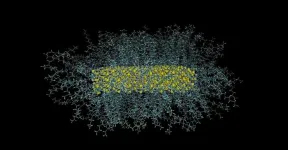(Press-News.org) Scientists have successfully bred corals to improve their heat tolerance
A new study has shown that selective breeding can lead to a modest rise in coral heat tolerance.
Led by experts at Newcastle University’s Coralassist Lab, the study documents the world’s first effort to selectively breed adult corals for enhanced heat tolerance, i.e. the ability of adult corals to survive intense marine heatwaves. The breeding effort was a success, showing that it is possible to improve the heat tolerance of adult coral offspring, even in a single generation.
However, the improvement was modest in comparison to future marine heatwaves expected under climate change. The authors stress that rapid reductions of global greenhouse gas emissions are an absolute requirement to mitigate warming and give corals an opportunity to adapt.
The study was published in the journal Nature Communications. It was carried out in partnership with the University of Victoria, Horniman Museum and Gardens, Palau International Coral Reef Center, University of Derby, and the University of Exeter.
The publication is the result of a five-year project which was launched by Dr James Guest with funding from the European Research Council.
Not a silver bullet solution
“This work shows that selective breeding is feasible but not a silver bullet solution and that more research is needed to maximise breeding outcomes”, says study lead author, Liam Lachs, a Postdoctoral Research Associate at Newcastle University. He continues, reflecting that “in parallel, rapid reductions of global greenhouse gas emissions are an absolute requirement to mitigate warming and give corals an opportunity to adapt.
Dr Guest, Reader in Coral Reef Ecology at Newcastle University’s School of Natural and Environmental Sciences, explains that “the results show that selective breeding could be a viable tool to improve population resilience. Yet, there are still many challenges that need to be overcome. How many corals need to outplanted to benefit wild populations? Can we ensure there are no trade-offs (evidence so far suggests this is not a large risk)? How can we avoid dilution of selected traits once added to the wild? How can we maximise responses to selection?
“Given the moderate levels of enhancement we achieved in this study the effectiveness of such interventions will also depend on urgent climate action.”
Successful breeding trial
Selective breeding has been practiced by humans for thousands of years to produce animals and plants with desirable characteristics. Now it is being considered as a tool for nature conservation, particularly for coral reefs. These marine ecosystems are at the forefront of climate change impacts, as reef-building corals are highly sensitive to marine heatwaves. These can trigger mass coral bleaching and mortality events which have already led to considerable reef declines globally.
The experts conducted selective breeding trials for two different traits, either the tolerance to a short intense heat exposure (10 days, reaching +3.5°C) or a less-intense but long-term exposure more typical of natural marine heatwaves (1 month, reaching +2.5°C).
The team found that selecting parent colonies for high rather than low heat tolerance increased the tolerance of adult offspring. This result held for the response to both 10-day and 1-month exposures. Heat tolerance could in theory be enhanced by approximately 1 °C-week within one generation. However, this level of enhancement is likely insufficient to keep pace with unabated warming.
What’s next?
Selectively breeding for short-stress tolerance did not show evidence of enhancing the ability of offspring to survive the long heat stress exposure. With no genetic correlation detected, it is plausible that these traits are under independent genetic controls. This would have important implications, as interventions would benefit from cheap and rapid assays that can effectively identify heat tolerant colonies for breeding. However, if these assays do not predict adult colony survival to natural marine heatwaves, it presents a serious challenge for management interventions.
Study lead author, Dr Adriana Humanes, Postdoctoral Research Associate at the Coralassist Lab, Newcastle University, highlights that: “considerable work remains before selective breeding can be successfully implemented. A deeper understanding is needed to determine which traits to prioritize and how these traits are genetically correlated.”
Take home message
The authors say that this work is an important proof of concept: selective breeding corals for adult heatwave survival is possible. Now, they call for more research and development to understand how to operationalise breeding interventions and maximise outcomes to hopefully keep pace with the lower levels of warming that can be achieved with concurrent climate action.
Reference DOI : 10.1038/s41467-024-52895-1
--ends--
Images and videos: https://drive.google.com/drive/folders/1ZpSm2DsXL2LURG5sRyI4IL_dlE1SgBvK
END
Scientists have successfully bred corals to improve their heat tolerance
2024-10-14
ELSE PRESS RELEASES FROM THIS DATE:
Adaptability of trees persists after millions of years of climate change
2024-10-14
Seven of the most common forest trees in Europe have been shown to be able to shelter their genetic diversity from major shifts in environmental conditions. This is despite their ranges having shrunk and the number of trees having fallen sharply during ice age cycles. These are the findings of a study by a European consortium including Uppsala University, published in Nature Communications.
“From a biodiversity perspective, this is very positive because these trees are keystone species on which many other species depend,” says Pascal Milesi, Associate Professor of Plant Ecology and Evolution at Uppsala University and first author of the study.
The researchers aimed to investigate ...
Protein involved in balancing DNA replication and restarting found
2024-10-14
A protein that is involved in determining which enzymes cut or unwind DNA during the replication process has been identified in a new study.
In a new paper published in Nature Communications, an international team of researchers have found that the protein USP50 supports the DNA replication process by helping to decide the proper use of nucleases or helicases. These enzymes are implemented during the DNA replication process to promote ongoing replication and where the copying machinery runs into problems ...
How liberals and conservatives can have better conversations, according to a psychologist
2024-10-14
Bridging Our Political Divide collects the insights of a psychologist who offers antidotes to the unproductive arguments that now dominate our political culture and ways to find common ground.
New York, U.S./Oxford, UK, October 14, 2024 – As the 2024 US Presidential Election in November inches closer, the partisan divide in American society has never felt more apparent – or pervasive.
From workplace chatter to heated discussions at family gatherings, many Americans may have asked themselves, ‘How can I make this ...
Survey finds 25% of adults suspect they have undiagnosed ADHD
2024-10-14
COLUMBUS, Ohio – Attention deficit/hyperactivity disorder – also known as ADHD – is typically thought of as a childhood condition. But more adults are realizing that their struggles with attention, focus and restlessness could in fact be undiagnosed ADHD, thanks in large part to trending social media videos racking up millions of views.
A new national survey of 1,000 American adults commissioned by The Ohio State University Wexner Medical Center and College of Medicine finds that 25% of adults now suspect they may have undiagnosed ADHD. But what worries mental health experts is that only 13% of survey respondents have shared their suspicions with their doctor.
That’s ...
Let there be light: Bright future for solar panels, TV screens and more
2024-10-14
From brighter TV screens to better medical diagnostics and more efficient solar panels, new Curtin-led research has discovered how to make more molecules stick to the surface of tiny nanocrystals, in a breakthrough that could lead to improvements in everyday technology.
Lead author Associate Professor Guohua Jia from Curtin’s School of Molecular and Life Sciences, said the study investigated how the shape of zinc sulfide nanocrystals affected how well molecules, known as ligands, stick to their surface.
“Ligands, play an important role in controlling the behaviour and performance ...
Innovative nanoparticle therapy targets fat absorption to combat obesity
2024-10-13
(Monday 14 October 2024, Vienna, Austria) Researchers have unveiled a novel approach to tackle obesity by targeting fat absorption in the small intestine. The cutting-edge nanoparticle system, engineered to deliver therapeutic molecules directly to the digestive tract, has shown significant potential to prevent diet-induced obesity.1,2
Presented today at UEG Week 2024, the study focuses on an enzyme called Sterol O-acyltransferase 2 (SOAT2), which plays a critical role in fat absorpsion in the small intestine.3,4 By inhibiting this enzyme in the small intestine, the study offers a promising therapeutic approach to reduce fat absorption ...
Novel procedure combined with semaglutide may eliminate insulin dependency in type 2 diabetes
2024-10-13
(Monday 14 October 2024, Vienna, Austria) Groundbreaking research presented today at UEG Week 2024 reveals a promising new treatment strategy for type 2 diabetes (T2D) that could significantly reduce or even eliminate the need for insulin therapy.1
This innovative approach, which combines a novel procedure known as ReCET (Re-Cellularization via Electroporation Therapy) with semaglutide, resulted in the elimination of insulin therapy for 86% of patients.
Globally, T2D affects 422 million people, with obesity recognised as a significant ...
Three key signs of major trauma could speed up treatment of severely injured children brought to emergency departments by carers not ambulances
2024-10-13
Copenhagen, Denmark: Severely injured children who are brought to an emergency medical department by their parents or carers are often not seen as quickly as those who arrive at hospital via ambulance, according to findings presented at the European Emergency Medicine Congress today (Monday). [1]
The study’s researchers identified three key trauma features that should prompt doctors to review these patients immediately and potentially prioritise their treatment: boggy swelling to the head, abdominal bruising, and thigh swelling or deformity.
The study was carried out in an inner-city ...
Climate change is a health emergency too
2024-10-13
Copenhagen, Denmark: International experts in emergency medicine have warned that climate change is likely to have a severe impact on emergency services around the world. Despite this, few countries have assessed the scale of the impact or have a plan to deal with it.
In a special session at the European Emergency Medicine Congress today (Sunday), Luis Garcia Castrillo, a professor in emergency medicine, now retired, at the Hospital Marqués de Valdecilla, Santander, Spain, described how he and colleagues from EUSEM’s Emergency Medicine Day working group had asked 42 focus groups, consisting of experts in emergency medicine, prehospital care ...
Chronic stress accelerates colorectal cancer progression by disrupting the balance of gut microbiota, new study shows
2024-10-12
(13 October 2024, Vienna, Austria) Cutting-edge research has uncovered how chronic stress disrupts the balance of gut microbiota to speed up the progression of colorectal cancer (CRC), opening new avenues for CRC prevention and treatment.1
By eliminating certain gut bacteria and inducing stress, researchers were able to conclude a relationship between stress and gut microbiota in the progression of CRC, identifying a particular bacterial species as a potential therapeutic target.
Presenting the study at UEG Week 2024, lead researcher Dr Qing Li explained, “In our study, we used an antibiotic ...




